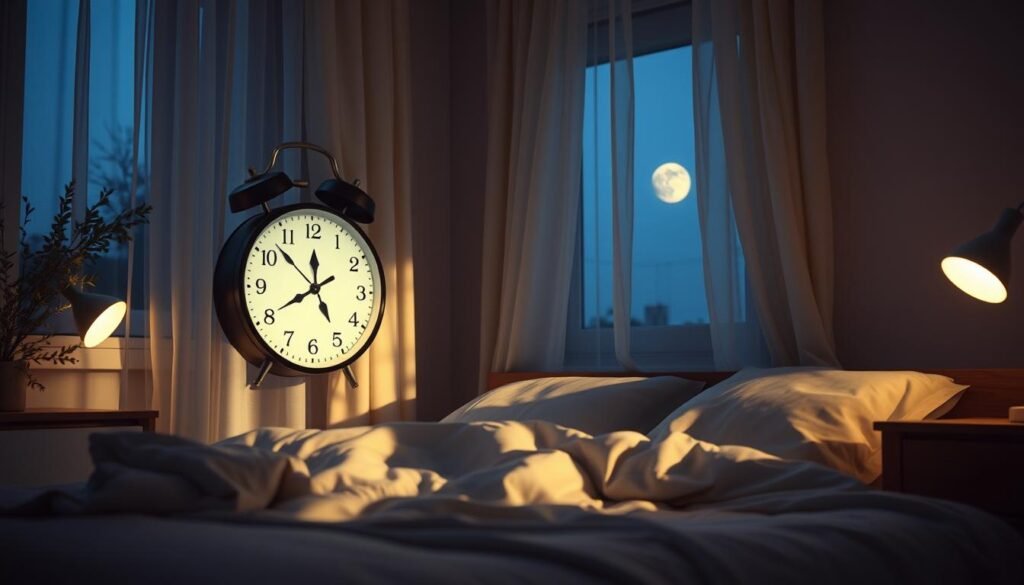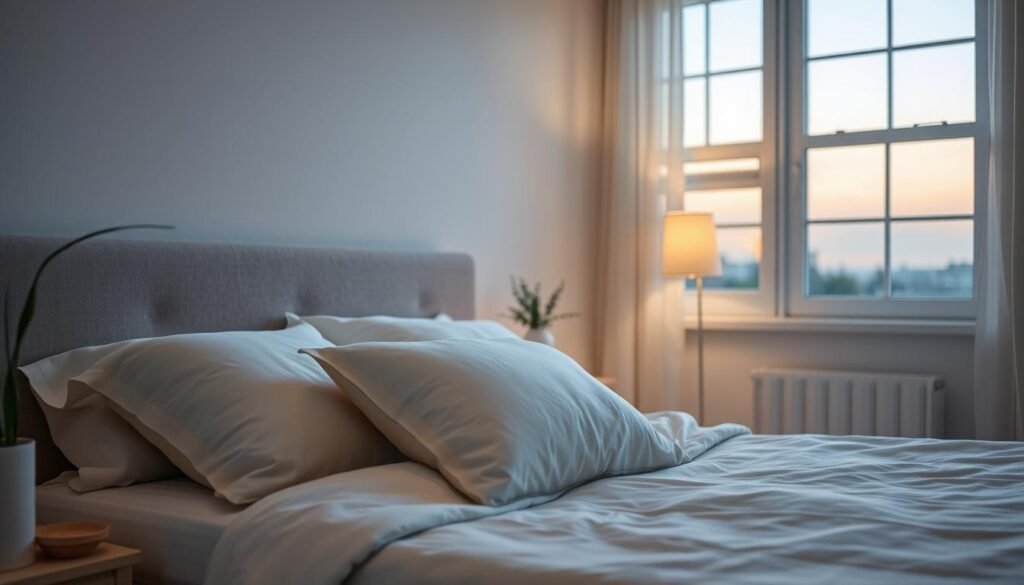Nearly 40% of people over 65 take five or more medications affecting their sleep. This fact highlights how aging changes sleep cycles, having a big impact on how well we sleep. As we get older, our sleep patterns change a lot, leading to issues that affect our health and how we think during the day.
Aging messes with our body clock, making sleep less consistent than when we were younger. Older adults often don’t get enough daylight, only about an hour a day, and face sleep problems like insomnia. Learning about these sleep changes is key for them. It helps them sleep better and live better. For details on sleep in the elderly, visit this resource.
Key Takeaways
- Disrupted sleep patterns are common among older adults due to changes in circadian rhythms.
- Inadequate daylight exposure can worsen sleep problems.
- Medications often lead to sleep issues, with many older adults experiencing insomnia.
- Conditions like nocturia and Restless Legs Syndrome increase sleep disturbances at night.
- Establishing healthy bedtime habits can significantly improve sleep quality.
Introduction to Sleep and Aging
Sleep is crucial for our physical and mental well-being, more so as we grow older. Studies show that older adults tend to face age-related sleep changes. These changes can affect their sleep in many ways. Sadly, many end up sleeping for only about 6.5 to 7 hours each night. This often causes them to wake up several times, approximately 3 or 4, throughout the night.
Among the common issues is insomnia. It’s quite widespread among the elderly. Sleep medications work differently in older people than in the young. Therefore, it’s key to talk to a doctor before trying any sleep aids. Especially since medications like antidepressants can aid sleep if depression is the cause.
Many older individuals experience broken sleep patterns, with less time in deep sleep. This situation can affect overall health. It might make them feel very sleepy during the day. It can also harm their thinking processes and mood. Not getting enough deep sleep can even make remembering things or solving problems hard.
It’s important to know about these changes to sleep cycles. Making changes in lifestyle, like avoiding caffeine, sticking to a sleep schedule, and relaxing before bed, can aid sleep improvement.
Understanding the obstacles that come with age-related sleep changes is crucial. It helps in coming up with ways to enhance sleep. Learning about these things not only helps with getting better rest at night. It also helps older adults stay sharp mentally and emotionally strong.
Understanding Sleep Cycles
Sleep plays a big role in keeping us healthy and happy. It includes light sleep, deep sleep, and REM sleep. Each has a job in making us feel good and work well each day.
Stages of Sleep: Light and Deep Sleep
Our sleep starts with light sleep, also called Stage 1 NREM sleep. It’s about 5% of our sleep. Then we move to Stage 2 NREM sleep, which is most of our sleep time, about 45%. This part gets us ready for deep sleep.
Deep sleep is about 25% of our sleep and is really important. It helps our muscles repair and grow. This part of sleep is key for feeling rested.
REM Sleep and its Importance
About 25% of our sleep is REM sleep. It’s important for keeping memories and handling feelings. Our brain is active like we’re awake, but our body can’t move. This helps us process what we’ve learned and felt.
How Sleep Cycles Repeat Throughout the Night
We go through 4 to 5 sleep cycles a night. Each cycle is 90 to 120 minutes long. We repeat the sleep stages, which helps our body and mind recover. It makes us feel refreshed.
Waking up from deep sleep can make us feel groggy for about 30 minutes. This is called “sleep inertia.” It affects how alert and sharp we are.
Age-Related Changes in Sleep Patterns
As people get older, their sleep habits change a lot. They tend to sleep less and their sleep quality varies. Understanding how aging affects sleep helps us know more about the restorative nature of sleep.
Changes in Sleep Duration
Older adults often sleep less, about 6.5 to 7 hours each night. This decrease happens for many reasons, like health issues and body changes. They also wake up a lot at night, making their sleep less restful over time.
How Aging Affects Sleep Quality
With age, people don’t sleep as well. They wake up often at night and very early in the morning. This makes them feel tired during the day. Conditions like sleep apnea or restless legs syndrome can make sleep quality even worse.
Impact on Sleep Architecture
The structure of sleep changes as people age. Older individuals have less deep sleep. Even though REM sleep might stay the same, the lack of deep sleep means they don’t feel as refreshed. This change drastically alters how energized a person feels in the morning.
Sleep Cycles and Aging: A Closer Look
As people age, their sleep patterns change. This change is linked to circadian rhythms and melatonin levels. Many older adults find themselves going to bed and waking up earlier. This change impacts the amount and quality of their sleep. Aging also leads to lower melatonin levels, which is important for sleep regulation.
Evaluating Circadian Rhythms in Older Adults
Older adults often face disrupted circadian rhythms, leading to broken sleep. Common health conditions in this age group can make sleep even more fragmented. Research shows that nearly 40% of people over 65 are on five or more medications, affecting their sleep. This complexity underscores the need to look closely at individual sleep patterns.
Reduced Melatonin Levels with Age
The decline in melatonin production as one gets older impacts sleep. With lower melatonin, people wake up more during the night. This reduction is crucial because it can start a cycle of not getting enough sleep. This cycle can worsen health issues for seniors.
Effects of Sleep Deprivation in the Elderly
Sleep deprivation is risky for older adults, affecting 40% to 70% of them. Lack of enough sleep can lead to cognitive decline and poor physical health. It is also linked to higher chances of dying, dementia, heart disease, and type 2 diabetes. The link between not getting enough sleep and health is strong. It shows how vital good sleep hygiene is with age.

| Effect of Aging on Sleep | Percentage |
|---|---|
| Adults over 65 taking five or more medications | 40% |
| Older adults with chronic sleep issues | 40% – 70% |
| Nighttime urination affecting sleep | 80% |
| Restless Legs Syndrome prevalence | 9% – 20% |
| Excessive daytime sleepiness | 20% |
Common Sleep Disorders Among Older Adults
Sleep disorders really affect older adults’ quality of life. It’s key to know how widespread these issues are and their impact. Insomnia is a big one, but sleep apnea and restless legs syndrome also disrupt sleep. Spotting these problems is crucial for good health and wellbeing.
Insomnia and its Prevalence
Many older adults deal with insomnia. About 75% of those over 65 face it as a main sleep issue. It shows up as trouble falling asleep, waking up often, and waking up too early. Some healthy older folks wake up a lot at night, but it doesn’t mean they’re sick. Still, it messes with their sleep quality.
Understanding Sleep Apnea Risks
Sleep apnea is common in older people. It stops breathing briefly during sleep, causing choppy sleep and tiredness in the day. Being overweight, smoking, and certain health issues can raise the risk. With sleep apnea, you might feel super sleepy during the day. This can lead to accidents and hurt how well you think.
Restless Legs Syndrome and Other Disorders
Restless legs syndrome makes your legs feel weird, urging you to move them to feel better. This can make sleeping hard. Nighttime bathroom visits and issues from chronic pain or medical conditions can also mess with sleep. Handling these problems well is important for each person’s health situation.
| Sleep Disorder | Prevalence (%) | Impact on Sleep Quality |
|---|---|---|
| Insomnia | 75 | Non-refreshing sleep |
| Sleep Apnea | Unknown | Fragmented sleep, daytime fatigue |
| Restless Legs Syndrome | Unknown | Difficulty falling asleep |
The Impact of Health on Sleep Quality
Health greatly affects sleep quality. Chronic illnesses, mental health issues, and medication effects are key factors. Understanding how these affect sleep can improve both sleep and health.
How Chronic Illnesses Affect Sleep
Chronic conditions like arthritis and heart disease often disrupt sleep. The discomfort and pain from these illnesses make it hard to sleep well. People with chronic conditions should look for ways to sleep better.
This can help improve their overall health.
Mental Health and Sleep Connections
Mental health and sleep are closely linked. Sleep problems can lead to anxiety and depression. On the other hand, poor sleep can make mental health issues worse.
This creates a harmful cycle. Understanding this link is important for managing both mental health and sleep.
The Role of Medication in Sleep Issues
Older adults often use medications that affect sleep. The impact of medications on sleep can vary greatly. Some may cause sleepiness, while others can cause insomnia.
Talking to healthcare providers about medication effects is important. It helps find a good balance that supports quality sleep.
| Health Factor | Impact on Sleep Quality |
|---|---|
| Chronic Illnesses | Increased discomfort and pain disrupt sleep, leading to difficulties in achieving restful sleep. |
| Mental Health | Poor sleep exacerbates anxiety and depression, creating a cycle that affects overall health. |
| Medication | Some medications can induce drowsiness while others disrupt sleep patterns, complicating sleep quality. |
Consequences of Poor Sleep in Older Adults
Poor sleep affects older adults, especially their thinking and memory. It makes the brain less sharp and remembering harder. This makes daily activities tougher, impacting how they interact with others.
Cognitive Function and Memory Enhancement
Sleep is key for good brain function and memory. It helps lock in memories and boosts learning. Lack of sleep hurts these abilities, causing memory and thinking problems.
Good sleep habits can help keep the brain working well as we age.
Physical Health Risks Associated with Sleep Deprivation
Not sleeping enough can harm older adults’ physical health. It raises the risk of high blood pressure, diabetes, and heart problems. Poor sleep also links to weight gain and worsening health.
Understanding Overall Health Impact
Lack of sleep doesn’t just affect the brain and body. It also harms emotional health, leading to tiredness, worry, and confusion. It shows how crucial sleep is for older adults.
To better their lives, they should focus on getting enough sleep. This can lessen bad effects and improve life. For more info, visit this resource.
Strategies to Improve Sleep Quality
Getting better sleep is important for our health, especially as we get older. Good sleep hygiene habits can help create the perfect setting for deep sleep. This part gives tips for a good night’s rest and introduces relaxation techniques for bedtime routines.
Sleep Hygiene Tips for Better Rest
To improve sleep quality, it’s essential to follow some key tips. These include:
- Going to bed and waking up at the same time every day.
- Staying away from caffeine and nicotine before bedtime.
- Keeping your sleeping space cool and quiet. Letting in natural light during the day helps too.
- Drinking less alcohol, especially right before bed. It might seem to help at first, but it can interrupt your sleep later.
The Importance of Consistent Sleep Schedule
Sticking to a regular sleep schedule is key for good sleep. Miner points out that adults should limit naps to 30 minutes or less before 2 p.m. This helps keep our natural desire for sleep strong at night. A consistent routine helps us fall asleep faster and more smoothly.
Relaxation Techniques Before Bedtime
Using relaxation techniques before bed can improve how we sleep. Practices like yoga, deep breathing, or drinking calming teas such as chamomile or valerian are beneficial. Scents like lavender can also make a relaxing environment, making it easier to fall asleep.

For more tips on consistent sleep routines, check out effective sleep practices. These can truly change how well you sleep.
| Tip | Description |
|---|---|
| Sleep Schedule | Set a regular bedtime and wake-up time for consistent sleep. |
| Avoid Stimulants | Reduce intake of caffeine, nicotine, and alcohol for better sleep. |
| Bedtime Relaxation | Practice calming activities before bed, like gentle yoga or deep breathing. |
| Comfortable Environment | Make your bedroom cool, quiet, and dark for the best sleep. |
By following these simple steps, you can greatly improve your sleep hygiene. This leads to better overall sleep quality.
Daytime Napping and Its Effects
Daytime napping is common among older people. Statistics show 20% to 60% of them nap regularly. In China, the number is higher, with 55% to 60% taking afternoon naps. Reasons for this trend include changes in daily activities, social life, health, and retirement. Interestingly, older adults nap more than younger ones. Research in ten countries, including the USA, China, and Japan, provides insight into this.
Prevalence of Daytime Naps in Older Adults
For older adults, napping can be good and bad. Short naps help with memory and emotions. But long naps, over 90 minutes, might mean bad night sleep. They could lead to cognitive issues, hypertension, and diabetes. There’s a strong connection between long naps and cognitive decline in the elderly. This shows the need for balance in daytime rest.
Optimal Nap Durations for Better Sleep
Knowing how long to nap is key. The best naps for older adults last 20 to 40 minutes. Such naps boost alertness without affecting night sleep. Also, napping between 1 and 4 p.m. matches our natural sleep rhythms. Studies have shown these naps, especially 30 to 90 minutes long, improve brain functions like memory.
Naps and brain health is a complex topic. Some research points to risks of long naps, like higher Alzheimer’s risk. It’s crucial to watch how much you nap for your health. For more on napping and Alzheimer’s, see this article.
Behavioral and Lifestyle Modifications for Better Sleep
To get better sleep, try changing some daily habits. Focus on nutrition and sleep and make sure to get regular exercise. These steps can really improve your sleep quality.
Nutrition and Sleep: Foods That Help or Hinder
What you eat affects your sleep. Some foods make it easier to sleep, like spinach, nuts, and bananas. They have magnesium, which helps relax muscles. But, eating too much sugar or caffeine can keep you awake. Knowing how nutrition and sleep relate helps you choose better bedtime snacks.
The Role of Exercise on Sleep Quality
Regular exercise helps you sleep better. It uses up energy, helping you fall asleep faster and deepen your sleep. Try to get 150 minutes of exercise like walking or cycling every week. Adding strength exercises also helps. Doing this sets your body’s clock right and keeps your sleep schedule regular.

Seeking Professional Help for Sleep Issues
If you’re having trouble sleeping often, it can really affect your day. When you find yourself awake at night at least three times a week for over three months, it’s time to think about getting help. Sleep studies help figure out why you can’t sleep well and what can be done.
When to Consider Sleep Studies
Sleep studies, known as polysomnography, watch how you sleep in a special setting. They’re important if:
- You can’t fall asleep easily or stay asleep.
- You wake up a lot, messing up your rest.
- You’re always tired during the day, hurting your life.
- You snore loudly or stop breathing when you sleep.
After these studies, doctors can give you advice made just for you. This way, you get the right help for your sleep problems.
Evaluating the Need for Medical Interventions
Some sleep issues might need medical help. The choice to get help depends on:
| Condition | Recommended Intervention | Notes |
|---|---|---|
| Chronic Insomnia | Cognitive Behavioral Therapy (CBT) | This method works well over time. |
| Sleep Apnea | Continuous Positive Airway Pressure (CPAP) | It keeps your airways open while you sleep. |
| Restless Legs Syndrome | Medication or lifestyle changes | It helps you feel less uncomfortable and sleep better. |
Talking about sleep health is key when looking at treatment options. Dealing with sleep issues can make you feel better and live better.
Conclusion
It’s important for older adults to understand how sleep cycles and aging are linked. This knowledge can help them sleep better. As people get older, they tend to sleep less, about 8 to 10 minutes less for every decade. This change is affected by health, lifestyle, and where they live.
As sleep quality drops and wake-ups during the night become more common, it’s key to have good sleep habits. Problems like not being able to sleep or sleep apnea can affect your overall health. They can also impact how well you think and move. So, improving sleep isn’t just about feeling rested. It’s about staying healthy as you age.
By focusing on sleep habits and working with doctors, better sleep can be achieved. Older adults who make sleep a priority improve their health and have a better daily life. Prioritizing sleep makes a big difference in quality of life.